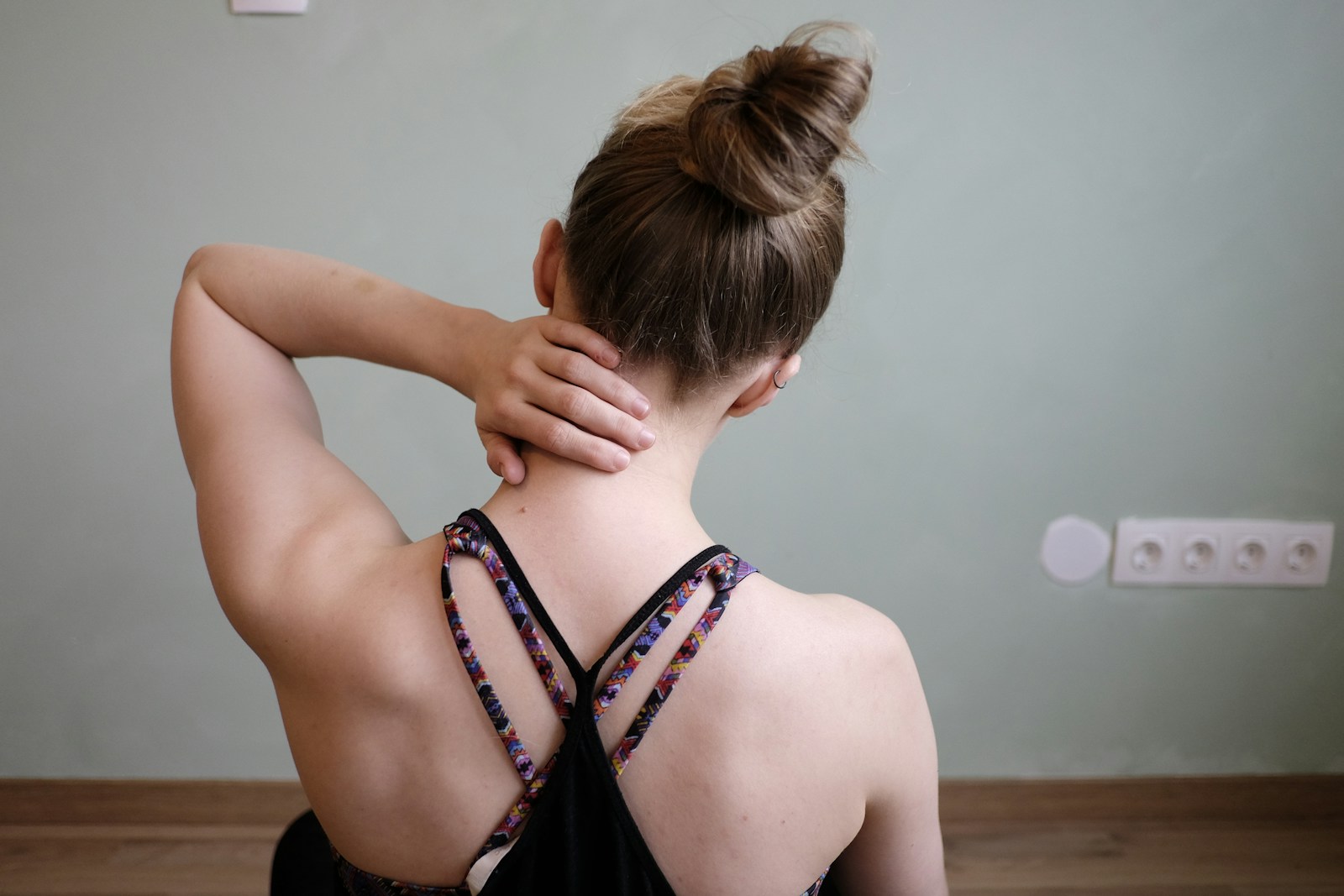Stiff neck, an ailment that many of us may unfortunately be familiar with, is more than just a minor inconvenience. It can greatly impact our daily lives, and in some instances, may even be a sign of a more serious underlying condition. While several remedies and interventions are available, a thorough understanding of this ailment, its causes, and prevention methods is necessary for effective management. This discussion aims to shed some light on this common, yet often misunderstood condition, and we invite you to join us as we explore the intricacies of ‘stiff neck’.
Understanding the Stiff Neck
Neck stiffness, a prevalent medical complaint, is a intricate condition that can arise from a multitude of factors, ranging from minor strain to severe health complications, warranting a thorough understanding for precise diagnosis and treatment. This condition, often deemed as a mere physical ailment, also has a psychological aspect called ‘Neck Stiffness Psychology,’ which refers to the psychological stress or trauma that could potentially exacerbate neck stiffness.
A detailed analysis of the individual’s mental state is therefore crucial in the complete treatment of neck stiffness. Studies have shown that chronic stress can cause muscular tension, leading to physical pain, such as neck stiffness. Understanding this link between the mind and the body can lead to more effective, holistic treatment plans.
Additionally, a ‘Stiff Neck Diet’ plays a significant role in managing the condition. Certain foods, rich in anti-inflammatory properties, can aid in reducing inflammation, a common cause of neck stiffness. A diet comprising fruits, vegetables, lean proteins, and whole grains, while limiting processed foods and sugars, can contribute to alleviating symptoms. Hence, an informed approach combining both psychological understanding and a balanced diet can greatly improve the treatment and management of neck stiffness.
Common Causes of Stiff Neck
While psychological factors and dietary habits certainly influence the occurrence and severity of this condition, it is also important to shed light on the various physical causes that can lead to a stiff neck.
One significant physical factor is the importance of neck posture. Prolonged periods of poor posture, such as hunching over a computer or looking down at a smartphone, can strain the muscles and ligaments in the neck, leading to stiffness. Similarly, sleeping in an awkward position that does not support the natural curve of the neck can also result in a stiff neck.
Another common cause is physical stress or injury to the neck, highlighting the stress impact on this condition. This could be due to a sudden jerk of the neck during sports or from a car accident, commonly known as whiplash.
Lastly, conditions like osteoarthritis, spinal stenosis, and disc herniation are some of the degenerative diseases that can cause neck stiffness. These conditions cause wear and tear of the neck joints and discs, leading to inflammation, nerve compression, and subsequently, a stiff neck. It is important, therefore, to identify and address these common causes promptly for effective management of this condition.
Symptoms and Identification
Identifying the symptoms of neck stiffness is crucial for timely diagnosis and effective treatment. Common manifestations of this condition include an inability to move the neck without discomfort, pain that may extend to the shoulders or arms, and a headache. Importantly, a change in neck posture is often observed. The individual may hold their head in a tilted or turned position in an attempt to mitigate the discomfort.
Infection induced stiffness is another significant cause. Symptoms can be more severe and include fever, chills, swollen lymph nodes, and in some cases, nausea and vomiting. These symptoms demand immediate medical attention due to the potential seriousness of the underlying infection.
Identification of neck stiffness relies heavily on physical examination and patient history. A doctor will examine the neck’s mobility, posture, and look for signs of infection. Additionally, they may inquire about recent activities that could have contributed to the problem. This could include intensive physical work, sleeping in an awkward position, or prolonged periods of stress.
Conclusively, recognizing the signs of neck stiffness can prompt early intervention, which may alleviate discomfort and prevent complications. Understanding the role of neck posture and infection induced stiffness is crucial in this process.
Impact on Daily Activities
The repercussions of neck stiffness extend beyond mere physical discomfort, impacting an individual’s daily activities to a great extent. Compromised sleep quality, resulting from the persistent discomfort, can lead to fatigue and a decrease in overall well-being. Additionally, productivity levels may diminish as neck stiffness can limit mobility, thereby hindering professional and personal tasks.
Sleep Quality Compromised
Compromised sleep quality, a common consequence of neck stiffness, can greatly impact daily activities and overall well-being. Pillow types and sleep positions play crucial roles in this equation. An unsuitable pillow can exacerbate neck stiffness, leading to interrupted sleep and fatigue, while incorrect sleep positions can put undue strain on the neck muscles, further impairing sleep quality. This cyclical problem often results in a decrease in daytime alertness and cognitive function, posing substantial challenges to performing daily tasks. The impact of neck stiffness on sleep quality is not just a matter of discomfort, but a serious concern that can affect a person’s daily life and health. Therefore, a strategic approach to pillow choice and sleep posture can significantly improve sleep quality.
Productivity Levels Diminished
Undoubtedly, neck stiffness can lead to a significant reduction in productivity levels, as it hampers the execution of daily activities and tasks. This condition necessitates workplace adaptations, like ergonomic adjustments and regular breaks, to mitigate discomfort and maintain efficiency. However, there is an inevitable drop in productivity due to physical limitations and increased fatigue. Beyond just the physical implications, the constant pain and discomfort can have severe mental health implications. The persistent discomfort can lead to stress, anxiety, and even depression if not properly managed. Hence, it’s important to address both the physical and mental impacts of neck stiffness to maintain high productivity levels. Essentially, the repercussions of neck stiffness extend much further than physical discomfort, impacting both productivity and mental health.

Stiff Neck Vs. Serious Conditions
While a stiff neck is often a harmless condition resulting from poor posture or strain, it’s important to distinguish it from symptoms that might signal more serious medical conditions. Neck Massage Benefits and Posture Correction Techniques can be instrumental in alleviating the discomfort of a stiff neck, but their inability to provide relief may indicate a more serious issue.
For instance, if neck stiffness is accompanied by high fever, severe headache, nausea, or vomiting, this could be a sign of meningitis, a potentially life-threatening condition. Similarly, if the stiffness is extreme, making it impossible to touch the chin to the chest, it might indicate a serious spinal injury. Additionally, if the neck pain is persistent, sharp, and accompanied by unexplained weight loss, it could be a symptom of cancer.
The importance of distinguishing between a common stiff neck and these serious conditions cannot be underestimated. A precise understanding of the symptoms, coupled with a thorough medical evaluation, is pivotal in these scenarios. While Posture Correction Techniques and Neck Massage Benefits are valuable in managing a stiff neck, they are not substitutes for professional medical advice and treatment when more serious conditions are suspected.
Home Remedies for Relief
In addressing neck stiffness, home remedies often serve as a first line of defense. Consideration of natural pain relief methods and effective neck exercises can potentially offer significant relief. This section will explore these strategies in detail, examining their efficacy and applications.
Natural Pain Relief Methods
Exploring home remedies for neck stiffness, one can uncover a variety of natural pain relief methods that offer an alternative to traditional medical treatments. These include acupuncture and massage, both of which have unique benefits.
Acupuncture benefits include the promotion of natural healing by stimulating specific points on the body. It can effectively alleviate neck stiffness and associated pain. Massage techniques, on the other hand, manipulate soft tissues to improve circulation, reduce tension, and promote relaxation.
Additional home remedies include:
- Heat Therapy: Applying a warm compress can increase blood flow and soothe stiff muscles.
- Cold Therapy: Conversely, a cold pack can reduce inflammation and numb pain.
- Herbal Remedies: Certain herbs like turmeric and ginger have anti-inflammatory properties.
- Rest: Sometimes, simply ensuring adequate rest and proper posture can help alleviate neck stiffness.
Effective Neck Exercises
Regularly incorporating neck exercises into your routine can serve as an important home remedy for alleviating neck stiffness. These exercises help improve flexibility, enhance strength, and reduce tension. The neck massages benefits are manifold, including improved circulation and relief from muscle tension. Massages can be self-administered or received professionally, always using gentle movements. Yoga influence can also be instrumental in relieving neck stiffness. The incorporation of specific yoga poses such as the ‘Bharadvaja’s twist’ and the ‘Bridge pose’ strengthens and stretches neck muscles, promoting flexibility and relief. However, it’s vital to remember that these exercises should be performed under proper guidance, especially if you’re new to yoga or have severe neck stiffness. This proactive approach to neck health can provide significant relief.
Exercises to Ease Stiffness
To alleviate neck stiffness, certain exercises, when performed correctly and consistently, can prove to be highly beneficial. Two techniques that provide notable relief are Posture Correction and Neck Massage.
Posture correction is an effective exercise that can help reduce neck stiffness. By ensuring that the head is aligned with the body and not protruding forward, one can reduce the strain on the neck muscles. This can be practiced while standing, sitting, or even while sleeping.
Neck massage, when done correctly, can greatly alleviate neck tension. Gentle circular motions focused on the painful areas can help ease the stiffness. It not only improves blood circulation but also aids in muscle relaxation.
Additional exercises include:
- Chin Tucks: This exercise strengthens the neck muscles and improves posture. It involves pulling the chin straight back, creating a ‘double chin’.
- Neck Stretch: A simple side-to-side neck stretch can help reduce stiffness.
- Neck Rotation: Slowly turning your head to the left and right can improve flexibility and range of motion.
- Shoulder Rolls: Rolling your shoulders in both directions can help release tension in the neck and shoulders.
When to Consult a Doctor
While mild neck stiffness can often be managed with exercises and rest, it is imperative to consult a healthcare professional if the symptoms persist, intensify, or are accompanied by other concerning signs such as severe pain, numbness, weakness, or tingling in the arms or hands. It is vital not to dismiss these symptoms as they may indicate a more serious condition requiring immediate intervention.
Consideration of neck brace usage could be an important part of the consultation, as it may provide necessary support to the neck and limit its movement, thereby aiding in pain reduction. However, the use of a neck brace should be under a doctor’s guidance to avoid any potential harm.
Insurance considerations also play a significant role in these scenarios. It’s crucial to understand what your insurance covers, especially in cases where more extensive treatment might be needed. In some cases, insurance may cover physical therapy or chiropractic care, which could provide relief for neck stiffness.
Ultimately, timely consultation with a healthcare professional cannot be overstated. It is a critical step in accurately diagnosing the cause of your neck stiffness, enabling an effective treatment plan to be developed and preventing further complications.

Medical Treatments Available
After securing a precise diagnosis and discussing potential risks, your healthcare provider will devise a targeted treatment plan to address your neck stiffness, which may encompass a range of medical interventions. These treatments aim to alleviate the discomfort and restore mobility, while concurrently addressing the root cause of the stiffness.
Among the available interventions, some of the most common and effective include:
- Medication: Over-the-counter or prescribed anti-inflammatory drugs and muscle relaxants can provide immediate relief from pain and stiffness.
- Physical Therapy: Specialized exercises and stretches under the guidance of a trained physical therapist can help improve flexibility and strength.
- Massage: Research has substantiated the benefits of massage in reducing muscle tension and promoting relaxation.
- Acupuncture: Studies have confirmed the effectiveness of acupuncture in managing chronic pain conditions, including neck stiffness.
It is important to remember that the effectiveness of these treatments can vary from person to person. They can be used in combination or singularly, depending on the severity and cause of the stiffness. Always consult with your healthcare provider to determine the most suitable treatment plan for your specific situation.
Preventing Future Stiffness
Preventing future stiffness in the neck can be effectively achieved through proactive measures such as regular neck exercises and an ergonomic workspace setup. Regular neck exercises can help to maintain flexibility, strengthen neck muscles, and reduce the risk of recurrent stiffness. Moreover, the importance of creating an ergonomic workspace cannot be overstated, as a properly set up office can greatly reduce the strain on the neck, thereby minimizing the likelihood of developing stiffness.
Regular Neck Exercises
Incorporating regular neck exercises into your daily routine can noticeably reduce the chances of recurring stiffness and promote overall neck flexibility. These exercises contribute to both posture improvement and the effectiveness of neck massage techniques.
To establish an effective regimen, consider the following exercises:
- Neck Tilts: This simple exercise involves tilting your head from side to side, which can greatly improve neck flexibility.
- Neck Rotation: This involves gently turning your head from one side to another, promoting neck mobility.
- Neck Stretches: Stretching your neck muscles can help relieve tension and reduce stiffness.
- Shoulder Rolls: These can help strengthen the neck and shoulder muscles, contributing to better posture and reducing neck strain.
Ergonomic Workspace Setup
An essential workspace setup serves as a proactive measure in mitigating the risk of recurrent neck stiffness, ensuring ideal posture and reducing undue strain on the neck and shoulders. A thorough workstation evaluation is pivotal to this setup, examining the alignment of computer screens, chairs, desks, and keyboards in relation to the user’s body. Incorrect alignment can lead to poor posture and ultimately cause neck stiffness. Posture correction, another vital aspect of an ergonomic workspace, involves maintaining the natural curvature of the spine while seated, standing, or performing tasks. Regular breaks, stretching, and adjusting the workspace can help maintain good posture. Therefore, an ergonomic setup, combined with posture correction, can aid in lessening the recurrence of stiff neck.
Living With a Chronic Stiff Neck
Managing daily activities while dealing with chronic neck stiffness can pose significant challenges, requiring strategic planning and adaptation. Individuals with this condition often need to take into account various factors, such as their neckwear choices and the emotional impacts associated with their situation.
- Neckwear Choices: Selecting the appropriate neckwear is essential for those with chronic stiff neck. High collars or tight neckties can exacerbate discomfort and limit neck movement, as such, loose-fitting or open-necked clothing is recommended.
- Emotional Impacts: Chronic stiff neck can lead to emotional distress, such as frustration, anxiety, and depression. It’s important to seek psychological support and utilize stress management techniques to mitigate these impacts.
- Physical Exercise: Regularly performing neck exercises and stretches can help maintain flexibility, reduce stiffness, and improve posture.
- Medical Consultation: Persistent neck stiffness may indicate a more serious underlying condition. Regular check-ups with healthcare professionals can provide proper diagnosis and treatment options.
Living with a chronic stiff neck isn’t easy, but with careful consideration of lifestyle adaptations, emotional well-being, appropriate neckwear choices, and medical support, it becomes manageable. Remember, the goal is to optimize quality of life while managing the condition.
Frequently Asked Questions
Can Stress or Anxiety Cause Stiffness in the Neck?
Yes, stress or anxiety can cause neck stiffness due to the impact of poor posture often associated with these conditions. Effective stress management techniques can help in mitigating these physical manifestations, promoting overall health.
Can Stiff Neck Lead to Problems With Your Vision?
Yes, persistent neck stiffness can potentially affect vision. The impact of neck exercises and posture correction strategies can alleviate this issue by improving blood flow to the eyes and reducing muscular tension.
Does Wearing a Neck Brace Help With a Stiff Neck?
Yes, a neck brace can provide temporary relief. However, brace alternatives such as physical therapy can address the root cause of the discomfort and offer a more long-term solution to improve mobility and strength.
Are There Any Specific Foods to Avoid for Preventing Neck Stiffness?
No specific foods have been directly linked to neck stiffness. However, avoiding dietary inflammation triggers like processed foods, sugar, and alcohol can be beneficial. Hydration’s role in muscle health is also important to take into account.
Is There a Correlation Between Stiff Neck and Memory Problems?
There is no direct scientific evidence linking memory problems to a stiff neck. However, regular neck exercises and posture correction can improve overall well-being, potentially impacting cognitive functions positively, including memory.

